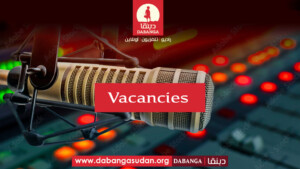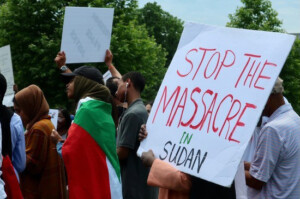Kandaka: Keeping women’s rights on the agenda in post-revolution Sudan
Last year, Sudan’s successful pro-democracy revolution made headlines around the world, with many international onlookers surprised at the integral and leading role played by women.
 Women call on government to talk to them about peace (Sari Omer)
Women call on government to talk to them about peace (Sari Omer)
Last year, Sudan’s successful pro-democracy revolution made headlines around the world, with many international onlookers surprised at the integral and leading role played by women.
Women made up an estimated 70 per cent of the mass demonstrations that led to the toppling of the Omar Al Bashir run regime. A photo of a woman wearing white, addressing protesters from a car rooftop, became a widely shared and defining image of the revolution.
High hopes were bestowed on Sudan’s transitional government to steer the nation towards democracy, and dismantle the structures and ‘morality laws’ that unjustly targeted women.
As the initial excitement of the revolution’s success faded, the Dabanga team decided to launch a new programme dedicated to keeping the spotlight on women’s rights, experiences, and achievements during the transition period.
The half-hour show – named Kandaka in reference to the Nubian Queens of Sudan’s ancient Kingdom of Kush – has been produced weekly throughout 2020 by freelance Sudanese journalist Hanadi Saaed.
For Hanadi, documenting women’s stories and issues during this period is not a responsibility she takes lightly.
“Kandaka will very soon be a record and archive on issues relating to women during these times of change and significance in Sudan. For researchers, academics, and whoever needs this information in the future,” she says.
In 2020, the show addressed a wide range of political, cultural, health, and social issues – from human trafficking to the gendered impacts of COVID-19 in IDP camps, to the (limited) role of women within the transitional government.

“Producing Kandaka is a natural extension of my work”, says Hanadi, who has a strong track record reporting on women’s issues in Sudan. She previously spent ten years as a Khartoum-based newspaper journalist reporting on topics such as the Public Order Regime (POR), women’s work in the informal sector economy, and Female Genital Mutiliation (FGM).
As Kandaka documented throughout 2020, the fight for women’s rights remains a long, uphill battle.
“It was us women who led the revolution…but now, one year after, there has not been much formal change – women are still suffering and struggling,” says Hanadi.
“It’s not only on the government, it’s the social mentality which is slow to change… Sudanese society is very male-dominated.” Nonetheless, Hanadi says there have been small marks of progress.
“For example, last week, the transitional government adopted new child and welfare rules – this was a positive step. Us women, we are not happy, but we’re happy about some of the progress we are making.”
“It was us women who led the revolution…but now, one year after, there has not been much formal change – women are still suffering and struggling.”
– Hanadi Saeed
Hanadi says moving into radio from print journalism has enabled her to connect with interviewees and audiences in different ways.
“Shortwave radio is most important – especially as women in camps can benefit from this because they often cannot access other traditional media.”
Kandaka is also published online and distributed via Whatsapp groups each week. Hanadi says this online and person-to-person sharing has helped build a loyal audience.
“For example, yesterday I received feedback from a woman in a refugee camp, who said she really likes my programme. The women told me that she distributed the Kandaka audio episodes further among young girls in the refugee camps.”

Now based outside of Sudan, Hanadi says the show helps nurture connections between Sudanese diaspora and those living in their home country.
“All my guests are Sudanese; they all were born and grew up in Sudan. But some now live abroad where they get better opportunities.
“I see my role as trying to bridge between them, and those in Sudan. Kandaka has a strong peer-to-peer element.”
Despite the challenges of 2020, and the uncertainties ahead, Hanadi remains optimistic.
“Us women have a long way to go and many changes we have to advocate for. But there is a small light at the end of the tunnel.”
The Kandaka programme will continue in 2021. Past episodes are available in Arabic on Soundcloud.

Selected English language news stories based on past episodes of Kandaka include:
- Interview: No to Women’s Oppression Initiative
- “All women are represented” in Sudan peace agreement
- Activist: Women link the social fabric in Sudan’s Nuba Mtns
- Covid-19 lockdown extended in Sudan capital (situation for tea sellers)
- Sudan campaign demands women governors
- Women’s participation in Sudan politics ‘inadequate and incomplete’
- Darfuri activist: “More women needed in decision making posts”
- Woman starts Covid-19 awareness campaign in West Darfur camps
Kandaka is supported financially by the National Endowment of Democracy.
Radio Dabanga’s editorial independence means that we can continue to provide factual updates about political developments to Sudanese and international actors, educate people about how to avoid outbreaks of infectious diseases, and provide a window to the world for those in all corners of Sudan. Support Radio Dabanga for as little as €2.50, the equivalent of a cup of coffee.












 and then
and then